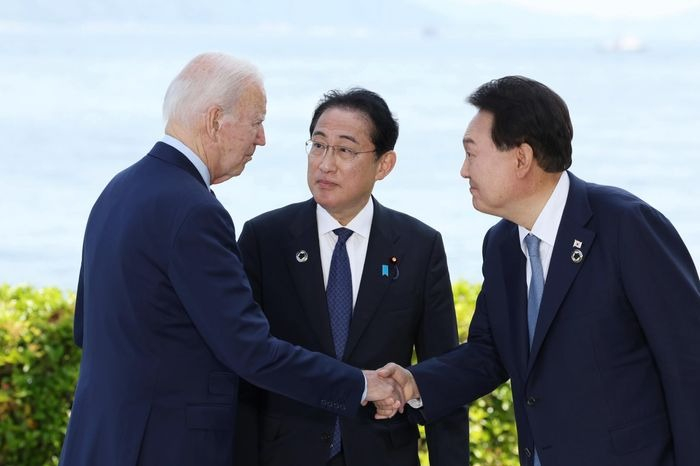Business & Politics
Camp David Summit to Unite U.S., South Korea, Japan
Concerns over North Korea’s missiles and China’s military expansion are pushing Seoul and Tokyo closer together
By The Wall Street Journal Aug 17, 2023 (Gmt+09:00)
4
Min read
Most Read
LG Chem to sell water filter business to Glenwood PE for $692 million


Kyobo Life poised to buy Japan’s SBI Group-owned savings bank


KT&G eyes overseas M&A after rejecting activist fund's offer


StockX in merger talks with Naver’s online reseller Kream


Mirae Asset to be named Korea Post’s core real estate fund operator



The leaders of the U.S. Japan and South Korea are meeting Friday at Camp David, where they are expected to announce details of the agreement, which will also cover intelligence sharing, supply chains and cybersecurity.
President Biden hopes that America’s two strongest allies in the region—which have a history of mutual antagonism—will embrace the benefits of a unified trilateral bloc. The meeting, with South Korea’s President Yoon Suk Yeol and Japan’s Prime Minister Fumio Kishida, will be the first summit to take place at the presidential retreat since Biden took office.
Japan and South Korea together host more than 80,000 American troops. Biden, his national security adviser, Jake Sullivan, and Secretary of State Antony Blinken, have lobbied Tokyo and Seoul on the importance of establishing a bloc, which Beijing has likened to an Asian NATO.
Asked Wednesday about Beijing’s criticism that the U.S. is setting up a mini-NATO against China, Kurt Campbell, Biden’s top Indo-Pacific adviser, said Washington is responding to a demand signal from countries in the Asia-Pacific region looking to counterbalance Chinese pressure.
“They feel in many respects under unimaginable pressure, huge pressures economically, diplomatically and militarily.” Campbell said, speaking at the Brookings Institution. He added that countries in the region have prospered over the past half-century and don’t want to see the order upended.
Missile threats from North Korea and deepening concerns over China’s massive buildup across Asia Pacific have pushed Japan and South Korea to set centuries of differences aside and join the U.S. in the trilateral alliance.
Despite growing criticism of China’s increasingly provocative actions across the region, getting Seoul to embrace a more hard-line approach has been no easy task. South Korea and Japan had previously shared concerns over Pyongyang’s aggression, but both countries—especially South Korea—have been reluctant to alienate Beijing.
“Over the years, we have moved from addressing difficult, sensitive issues of history to an increasingly ambitious and affirmative agenda,” Blinken told reporters Tuesday.
The announcement on Friday will cover enhanced ballistic-missile defense cooperation and joint military exercises. The three countries also will launch early warning systems to protect supply chains, including semiconductors and advanced technology security, and announce new cybersecurity initiatives, including the need to jointly combat disinformation, the officials said.
U.S. and Asian officials have said that the success of these efforts are largely a testament to the personalities and politics of Yoon and Kishida, both conservatives. The two leaders faced significant headwinds at home over their efforts to more closely align their countries, but have met numerous times over the past year and come to recognize their strength as a coalition.
A senior U.S. official said the two East Asian leaders were “extremely cautious and nervous” when they met on the sidelines of the North Atlantic Treaty Organization summit in Madrid last year, but Biden broke the ice, telling them “let’s put away the script.” That meeting, according to multiple officials, led to later, more relaxed discussions that often lasted late in the night.
Several U.S. officials said the administration isn’t encouraging Japan and South Korea to decouple from China given Beijing’s role in an integrated global economy. Washington does, however, want to advocate for supply-chain resilience, particularly in the wake of the global pandemic, and help allies avoid being overly reliant on any one country for critical goods and materials, one of the U.S. officials said.
Both Japan and South Korea, meanwhile, are realizing the importance of bolstering their security cooperation. While North Korea is a driving force pushing both countries together, China’s expanding role in the region weighs heavily on their minds and in their policy discussions.
Locking in the three-way relationship now is a top priority of the Biden administration, U.S. officials said.
South Korea-Japan rapprochement has historically been prone to abrupt backsliding. And Biden, who is running next year for re-election, has warned he could be succeeded by someone less committed to global alliances.
“China’s entire strategy is based on the premise that the U.S.’s number one and number two ally in the region can’t get together and get on the same page,” said Rahm Emanuel, the U.S. ambassador to Tokyo.
The new agreement changes that, he said. “It’s a foundational piece that alters all calculations.”
- Charles Hutzler contributed to this article.
Write to Vivian Salama at vivian.salama@wsj.com
More to Read
-

-
 EconomySouth Korea to boost aid for chipmakers to $23 billion, expanding extra budget
EconomySouth Korea to boost aid for chipmakers to $23 billion, expanding extra budgetApr 16, 2025 (Gmt+09:00)
-
 AutomobilesSouth Korea announces emergency support for auto sector against US tariffs
AutomobilesSouth Korea announces emergency support for auto sector against US tariffsApr 09, 2025 (Gmt+09:00)
-
 EconomyChina says it is aiming to coordinate tariff response with Japan, South Korea
EconomyChina says it is aiming to coordinate tariff response with Japan, South KoreaApr 02, 2025 (Gmt+09:00)
-

Comment 0
LOG IN


